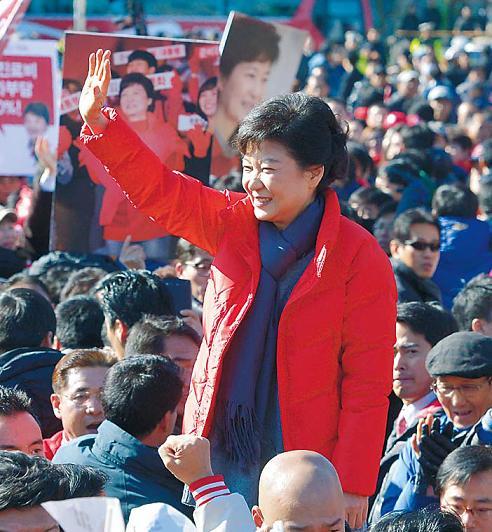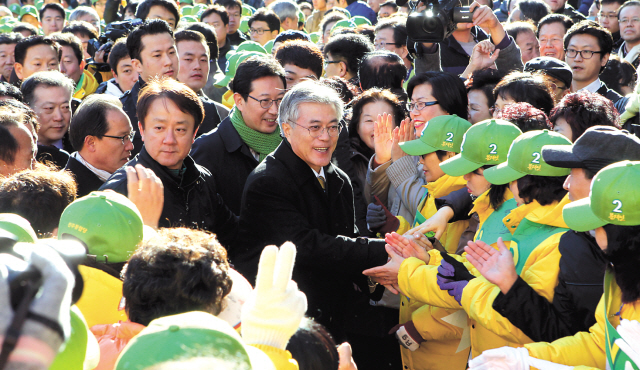Presidential candidates Park Geun-hye and Moon Jae-in hit the trails in the key battlegrounds of Daejeon and Busan, respectively, Tuesday at the start of their 22-day official campaign for Cheong Wa Dae.
The two leading candidates slammed each other hard as unfit to lead the nation as they vied for the swing votes that hold the key to the Dec. 19 election.
Polls released Monday showed Saenuri Party Park maintains a narrow lead against the Democratic United Party’s Moon with 44.7 percent against Moon’s 40.8 percent (Chosun Ilbo survey), 42.6 against 32.6 (Segye Ilbo), and 45 against 44.6 (DongA Ilbo).
They are to come face-to-face in the first television debate on Dec. 4, organized by the National Election Commission over the issues of politics, security, foreign affairs and inter-Korean relations. Third candidate Lee Jung-hee of the minority Unified Progressive Party will be joining the debate.
The two leading candidates slammed each other hard as unfit to lead the nation as they vied for the swing votes that hold the key to the Dec. 19 election.
Polls released Monday showed Saenuri Party Park maintains a narrow lead against the Democratic United Party’s Moon with 44.7 percent against Moon’s 40.8 percent (Chosun Ilbo survey), 42.6 against 32.6 (Segye Ilbo), and 45 against 44.6 (DongA Ilbo).
They are to come face-to-face in the first television debate on Dec. 4, organized by the National Election Commission over the issues of politics, security, foreign affairs and inter-Korean relations. Third candidate Lee Jung-hee of the minority Unified Progressive Party will be joining the debate.

Park started off her rally at Daejeon station, stressing her pledge to forge national unity and harshly criticizing her progressive rival.
“The opposition candidate was the highest-ranking associate of the failed administration that he himself had called a disgraced family,” Park said, targeting Moon. “We all remember how we wasted so much time on ideological debate as soon as the (Roh Moo-hyun) government assumed office with pushes to abolish the National Security Act or to revise the Private School Act.”
She held the former chief of staff to Roh responsible for the hikes in college tuition and real estate prices with aggravated polarization during the former administration.
“We are at an important juncture to decide whether to head toward a well-prepared future or to a failed past.”
Park, who aims to become Korea’s first female president, paid her respects to war veterans and past national leaders at the National Cemetery in Seoul before heading to the central South Chungcheong provinces, the key swing electorate that has often acted as a barometer of past elections.
Park had gained popularity in the region by opposing President Lee Myung-bak’s plan to revise the Sejong City relocation plan. Sejong City is a planned city in South Chungcheong Province to house a special administrative district.
In Daejeon, Park attended an event broadcasted live on the Web to mark the launch of her campaign with participants joining simultaneously from Seoul, Busan and Gwangju. Park also met with voters at a train station, traditional markets and a bus terminal.
“The Saenuri Party and I will not divide us up into different teams or take sides according to region or generation, or among those that had supported industrialization or democratization. I will gather all forces to create the new Republic of Korea through people’s grand unity,” Park said.
To appeal to the localites, Park promised to create a science-business belt in Daejeon, and continue to develop Sejong City to become the center of the country’s administration.
Later in the day, Park was bound for Jeolla Province to stay overnight, which is rare for the former party chairwoman, who has avoided sleeping away from home.
Jeolla Province, the liberal stronghold, has shown uncharacteristically high support for Park, posing itself as a key battleground.
While in the region, Park emphasized her promise to “stably support the development of Saemangeum,” and promote projects to activate the economy of North Jeolla Province. Saemangeum is an extensive plot of reclaimed land along the southwest coast.
Park will wrap the first leg of her rally after visiting a total of eight cities and 20 counties by Wednesday evening, campaign members said.
While Park targeted areas with which she has no specific ties, Moon Jae-in kicked off his campaign in his home town of Busan.
Although much of his speech was given over to his policies, the DUP candidate did not miss out on the opportunity to attack the Saenuri Party candidate.
“Park represents the remnants of the forces of the May 16 coup and the Yushin dictatorship,” Moon said referring to the May 16, 1961 coup and the dictatorial regime of Park’s late father Park Chung-hee.
“Even now (Park) doesn’t communicate with the public and her leadership is arrogant and self-righteous. How could new politics be brought about with such leadership?”
He added that Park and the conservative party are inherently unable to achieve economic democratization citing the Saenuri Party’s role in shooting down related issues such as raising the minimum wage.
The trip to Busan was followed by a visit to Changwon before coming back to Seoul to ply his welfare, economic and political reform policies to the voters.
The southern port city is also where he won his first National Assembly seat, a fact he did not forget to press in his speech.

“Today I take the first step to changing the future of Korea here in Busan that has raised me,” Moon said at the Busan express bus terminal. He added that he will become the president who realizes economic democratization and opens the new era of welfare state for Korea.
Regarding former independent candidate Ahn Cheol-soo, who forfeited in favor of the DUP candidate on Friday, Moon said that it was “a very beautiful decision” and that he will bring about political reform.
The DUP candidate also appealed to Ahn’s supporters saying that he will not forget the sacrifice and work with the former academic.
“I will take the lead in realizing the dream of new politics along with Ahn Cheol-soo.”
Much of his time in the two southern cities were given over to reiterating political reform plans saying that the DUP will renew itself and the country’s politics in general until deemed sufficient by the public.
In appealing to the voters in Busan and the surrounding Gyeongsang provinces, Moon raised the issue of the new airport, the plans for which have been scrapped under the Lee administration.
He said that the plans for the new airport need to be objectively reviewed, under the agreement of the concerned provincial governments in order for it to become a hub comparable to Incheon International Airport.
Moon also touched on the issue of nuclear power, saying that he is the right man for increasing the use of alternative energy in Korea and the Busan area, which according to Moon has the highest density of nuclear power plants.
By Lee Joo-hee and Choi He-suk
(jhl@heraldcorp.com) (cheesuk@heraldcorp.com)
-
Articles by Korea Herald







![[Graphic News] More Koreans say they plan long-distance trips this year](http://res.heraldm.com/phpwas/restmb_idxmake.php?idx=644&simg=/content/image/2024/04/17/20240417050828_0.gif&u=)
![[KH Explains] Hyundai's full hybrid edge to pay off amid slow transition to pure EVs](http://res.heraldm.com/phpwas/restmb_idxmake.php?idx=644&simg=/content/image/2024/04/18/20240418050645_0.jpg&u=20240419100350)






![[From the Scene] Monks, Buddhists hail return of remains of Buddhas](http://res.heraldm.com/phpwas/restmb_idxmake.php?idx=652&simg=/content/image/2024/04/19/20240419050617_0.jpg&u=20240419175937)

![[KH Explains] Hyundai's full hybrid edge to pay off amid slow transition to pure EVs](http://res.heraldm.com/phpwas/restmb_idxmake.php?idx=652&simg=/content/image/2024/04/18/20240418050645_0.jpg&u=20240419100350)

![[Today’s K-pop] Illit drops debut single remix](http://res.heraldm.com/phpwas/restmb_idxmake.php?idx=642&simg=/content/image/2024/04/19/20240419050612_0.jpg&u=)